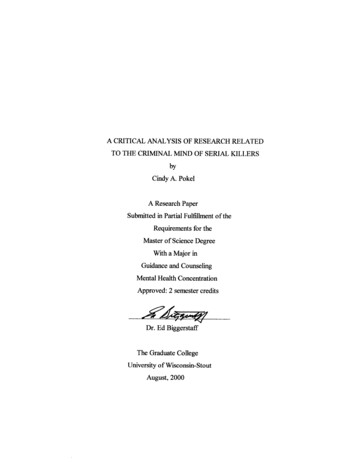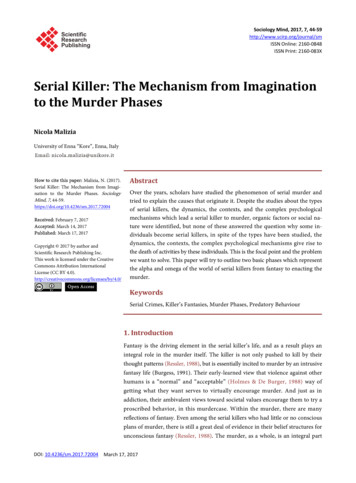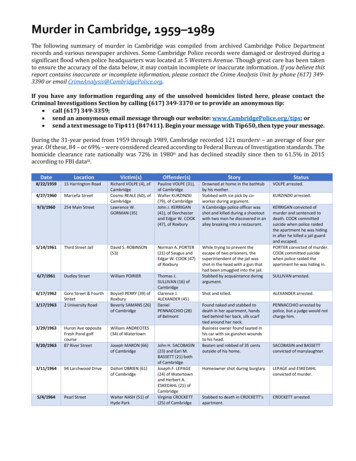
Transcription
MURDER ON THE ORIENT EXPRESSBy Agatha ChristiePART I THE FACTS1.AN IMPORTANT PASSENGER ON THE TAURUS EXPRESSIt was five o'clock on a winter's morning in Syria. Alongside the platform atAleppo stood the train grandly designated in railway guides as the Taurus Express.It consisted of a kitchen and dining-car, a sleeping-car and two local coaches.By the step leading up into the sleeping-car stood a young Frenchlieutenant, resplendent in uniform conversing, with a small man muffled up tothe ears of whom nothing was visible but a pink-tipped nose and the two points ofan upward-curled moustache.
It was freezingly cold, and this job of seeing off a distinguished stranger was notone to be envied, but Lieutenant Dubosc performed his part manfully. Gracefulphrases fell from his lips in polished French. Not that he knew what it wasall about. There had been rumours, of course, as there always were in suchcases. The General's—his General's—temper had grown worse and worse. Andthen there had come this Belgian stranger—all the way from England, it seemed.There had been a week—a week of curious tensity. And then certain things hadhappened. A very distinguished officer had committed suicide, another hadsuddenly resigned, anxious faces had suddenly lost their anxiety, certain militaryprecautions were relaxed. And the General, Lieutenant Dubosc's own particularGeneral, had suddenly looked ten years younger.Dubosc had overheard part of a conversation between him and the stranger. "Youhave saved us, mon cher," said the General emotionally, his great white moustachetrembling as he spoke. "You have saved the honour of the French Army—you haveaverted much bloodshed! How can I thank you for acceding to my request? Tohave come so far—"To which the stranger (by name M. Hercule Poirot) had made a fitting replyincluding the phrase—"But indeed, do I not remember that once you saved mylife?" And then the General had made another fitting reply to that, disclaiming anymerit for that past service; and with more mention of France, of Belgium, of glory,of honour and of such kindred things they had embraced each other heartily andthe conversation had ended.As to what it had all been about, Lieutenant Dubosc was still in the dark, but tohim had been delegated the duty of seeing off M. Poirot by the Taurus Express,and he was carrying it out with all the zeal and ardour befitting a young officerwith a promising career ahead of him."To-day is Sunday," said Lieutenant Dubosc. "Tomorrow, Monday evening, youwill be in Stamboul."
It was not the first time he had made this observation. Conversations on theplatform, before the departure of a train, are apt to be somewhat repetitive incharacter."That is so," agreed M. Poirot."And you intend to remain there a few days, I think?""Mais oui. Stamboul, it is a city I have never visited. It would be a pity to passthrough—comme ça." He snapped his fingers descriptively. "Nothing presses—Ishall remain there as a tourist for a few days.""La Sainte Sophie, it is very fine," said Lieutenant Dubosc, who had never seen it.A cold wind came whistling down the platform. Both men shivered. LieutenantDubosc managed to cast a surreptitious glance at his watch. Five minutes to five—only five minutes more!Fancying that the other man had noticed his glance, he hastened once more intospeech."There are few people travelling this time of year," he said, glancing up at thewindows of the sleeping-car above them."That is so," agreed M. Poirot."Let us hope you will not be snowed up in the Taurus!" "That happens?""It has occurred, yes. Not this year, as yet.""Let us hope, then," said M. Poirot. "The weather reports fromEurope, they are bad."Very bad. In the Balkans there is much snow." "In Germany, too, I have heard.""Eh bien," said Lieutenant Dubosc hastily as another pause seemed to be about tooccur. "Tomorrow evening at seven-forty you will be in Constantinople.""Yes," said M. Poirot, and went on desperately, "La Sainte Sophie, I
have heard it is very fine." "Magnificent, I believe."Above their heads the blinds of one of the sleeping-carcompartments was pushed aside and a young woman looked out.Mary Debenham had had little sleep since she left Baghdad on the precedingThursday. Neither in the train to Kirkuk, nor in the Rest House at Mosul, nor lastnight on the train had she slept properly. Now, weary of lying wakeful in the hotstuffiness of her overheated compartment, she got up and peered out.This must be Aleppo. Nothing to see, of course. Just a long, poorly lightedplatform with loud, furious altercations in Arabic going on somewhere. Two menbelow her window were talking French. One was a French officer, the other was alittle man with enormous moustaches. She smiled faintly. She had never seenanyone quite so heavily muffled up. It must be very cold outside. That was whythey heated the train so terribly. She tried to force the window down lower, but itwould not go.The Wagon Lit conductor had come up to the two men. The train was about todepart, he said. Monsieur had better mount. The little man removed his hat. Whatan egg-shaped head he had! In spite of her preoccupations Mary Debenhamsmiled. A ridiculous-looking little man. The sort of little man one could nevertake seriously.Lieutenant Dubosc was saying his parting speech. He had thought it outbeforehand and had kept it till the last minute. It was a very beautiful, polishedspeech.Not to be outdone, M. Poirot replied in kind. ."En voiture, Monsieur," said the Wagon Lit conductor. With an air of infinitereluctance M. Poirot climbed aboard the train. The conductor climbed after him.M. Poirot waved his hand. Lieutenant Dubosc came to the salute. The train, with aterrific jerk, moved slowly forward."Enfin!" murmured M. Hercule Poirot.
"Brrrrrrrr," said Lieutenant Dubosc, realising to the full how cold he was."Voilà, Monsieur!" The conductor displayed to Poirot with a dramatic gesturethe beauty of his sleeping compartment and the neat arrangement of his luggage."The little valise of Monsieur, I have put it here."His outstretched hand was suggestive. Hercule Poirot placed in it a folded note."Merci, Monsieur." The conductor became brisk and business-like. "I have thetickets of Monsieur. I will also take the passport, please. Monsieur breaks hisjourney in Stamboul, I understand?"M. Poirot assented. "There are not many people travelling, Iimagine?" he said."No, Monsieur. I have only two other passengers—both English. A Colonel fromIndia and a young English lady from Baghdad. Monsieur requires anything?"Monsieur demanded a small bottle of Perrier.Five o'clock in the morning is an awkward time to board a train. There were stilltwo hours before dawn. Conscious of an inadequate night's sleep, and of a delicatemission successfully accomplished, M. Poirot curled up in a corner and fell asleep.When he awoke it was half-past nine he sallied forth to the restaurant car in searchof hot coffee.There was only one occupant at the moment, obviously the youngEnglish lady referred to by the conductor. She was tall, slim and dark—perhaps twenty-eight years of age. There was a kind of cool efficiency in the wayshe was eating her breakfast and in the way she called to the attendant to bring hermore coffee which bespoke a knowledge of the world and of travelling. She wore adark-coloured travelling dress of some thin material eminently suitable for theheated atmosphere of the train.
M. Hercule Poirot, having nothing better to do, amused himself by studying herwithout appearing to do so.She was, he judged, the kind of young woman who could take care of herself withperfect ease wherever she went. She had poise and efficiency. He rather liked thesevere regularity of her features and the delicate pallor of her skin. He liked theburnished black head with its neat waves of hair, and her eyes—cool, impersonaland grey. But she was, he decided, just a little too efficient to be what he called"jolie femme."Presently another person entered the restaurant car. This was a tall man of betweenforty and fifty, lean of figure, brown of skin, with hair slightly grizzled round thetemples."The Colonel from India," said Poirot to himself.The newcomer gave a little bow to the girl. "Morning, MissDebenham.""Good morning, Colonel Arbuthnot."The Colonel was standing with a hand on the chair opposite her. "Any objections?"he asked."Of course not. Sit down.""Well, you know, breakfast isn't always a chatty meal." "I should hope not. But Idon't bite."The Colonel sat down. "Boy," he called in peremptory fashion. He gave an orderfor eggs and coffee.His eyes rested for a moment on Hercule Poirot, but they passed on indifferently.Poirot, reading the English mind correctly, knew that he had said to himself. "Onlysome damned foreigner."True to their nationality, the two English people were not chatty. They exchanged afew brief remarks and presently the girl rose and went back to her compartment.
At lunch time the other two again shared a table and again they both completelyignored the third passenger. Their conversation was more animated than atbreakfast. Colonel Arbuthnot talked of the Punjab and occasionally asked the girl afew questions about Baghdad where, it became clear, she had been in a post asgoverness. In the course of conversation they discovered some mutual friends,which had the immediate effect of making them more friendly and less stiff. Theydiscussed old Tommy Somebody and old Reggie Someone Else. The Colonelinquired whether she was going straight through to England or whether she wasstopping in Stamboul."No, I'm going straight on." "Isn't that rather a pity?""I came out this way two years ago and spent three days in Stamboul then.""Oh! I see. Well, I may say I'm very glad you are going rightthrough, because I am."He made a kind of clumsy little bow, flushing a little as he did so. "He issusceptible, our Colonel," thought Hercule Poirot to himselfwith some amusement. "The train, it is as dangerous as a sea voyage!" MissDebenham said evenly that that would be very nice. Hermanner was slightly repressive.The Colonel, Hercule Poirot noticed, accompanied her back to her compartment.Later they passed through the magnificent scenery of the Taurus. As they lookeddown towards the Cilician Gates, standing in the corridor side by side, a sigh camesuddenly from the girl. Poirot was standing near them and heard her murmur:"It's so beautiful! I wish—I wish—" "Yes?""I wish I could enjoy it!"Arbuthnot did not answer. The square line of his jaw seemed a little sterner andgrimmer."I wish to Heaven you were out of all this," he said. "Hush, please. Hush."
"Oh! it's all right." He shot a slightly annoyed glance in Poirot's direction. Then hewent on: "But I don't like the idea of your being agoverness—at the beck and call of tyrannical mothers and their tiresomebrats."She laughed with just a hint of uncontrol in the sound."Oh! you mustn't think that. The downtrodden governess is quite an explodedmyth. I can assure you that it's the parents who are afraid of being bullied by me."They said no more. Arbuthnot was, perhaps, ashamed of his outburst."Rather an odd little comedy that I watch here," said Poirot to himselfthoughtfully.He was to remember that thought of his later.They arrived at Konya that night about half-past eleven. The two English travellersgot out to stretch their legs, pacing up and down the snowy platform.M. Poirot was content to watch the teeming activity of the stationthrough a window pane. After about ten minutes, however, he decided that a breathof air would not perhaps be a bad thing after all. He made careful preparations,wrapping himself in several coats and mufflers and encasing his neat boots ingoloshes. Thus attired, he descended gingerly to the platform and began to pace itslength. He walked out beyond the engine.It was the voices which gave him the clue to the two indistinct figures standing inthe shadow of a traffic van. Arbuthnot was speaking."Mary—"The girl interrupted him."Not now. Not now. When it's all over. When it's behind us—then—"
Discreetly M. Poirot turned away. He wondered. .He would hardly have recognised the cool, efficient voice of MissDebenham. ."Curious," he said to himself.The next day he wondered whether, perhaps, they had quarrelled. They spoke littleto each other. The girl, he thought, looked anxious. There were dark circles underher eyes.It was about half-past two in the afternoon when the train came to a halt. Headswere poked out of windows. A little knot of men were clustered by the side of theline looking and pointing at something under the dining-car.Poirot leaned out and spoke to the Wagon Lit conductor who was hurrying past.The man answered, and Poirot drew back his head and, turning, almost collidedwith Mary Debenham who was standing just behind him."What is the matter?" she asked rather breathlessly in French. "Why are westopping?""It is nothing, Mademoiselle. It is something that has caught fire under the diningcar. Nothing serious. It is put out. They are now repairing the damage. There isno danger, I assure you."She made a little abrupt gesture, as though she were waving the idea of dangeraside as something completely unimportant."Yes, yes, I understand that. But the time!" "The time?""Yes, this will delay us.""It is possible—yes," agreed Poirot."But we can't afford delay! This train is due in at 6.55, and one has to cross theBosphorus and catch the Simplon Orient Express on the other side at nine o'clock.If there is an hour or two of delay we shall miss the connection."
"It is possible, yes," he admitted.He looked at her curiously. The hand that held the window bar was not quitesteady; her lips, too, were trembling."Does it matter to you very much, Mademoiselle?" he asked. "Yes. Yes, it does.I—I must catch that train."She turned away from him and went down the corridor to joinColonel Arbuthnot.Her anxiety, however, was needless. Ten minutes later the train started again. Itarrived at Hayda-passar only five minutes late, having made up time on thejourney.The Bosphorus was rough and M. Poirot did not enjoy the crossing. He wasseparated from his travelling companions on the boat and did not see them again.On arrival at the Galata Bridge he drove straight to the TokatlianHotel.2.THE TOKATLIAN HOTELAt the Tokatlian, Hercule Poirot asked for a room with bath. Then he stepped overto the concierge's desk and inquired for letters.
There were three waiting for him and a telegram. His eyebrows rose a little at thesight of the telegram. It was unexpected.He opened it in his usual neat, unhurried fashion. The printed words stood outclearly.Development you predicted in Kassner case has come unexpectedly.Please return immediately."Voilà ce qui est embêtant," muttered Poirot vexedly. He glanced up at the clock."I shall have to go on to-night," he said to the concierge. "At what time does theSimplon Orient leave?""At nine o'clock, Monsieur." "Can you get me a sleeper?""Assuredly, Monsieur. There is no difficulty this time of year. The trains arealmost empty. First-class or second?""First.""Très bien, Monsieur. How far are you going?" "To London.""Bien, Monsieur. I will get you a ticket to London and reserve yoursleeping-car accommodation in the Stamboul-Calais coach."Poirot glanced at the clock again. It was ten minutes to eight. "I have time to dine?""But assuredly, Monsieur."The little Belgian nodded. He went over and cancelled his room order and crossedthe hall to the restaurant.As he was giving his order to the waiter, a hand was placed on his shoulder."Ah, mon vieux, but this is an unexpected pleasure!" said a voice behind him.
The speaker was a short stout elderly man, his hair cut en brosse. He was smilingdelightedly.Poiret sprang up. "M. Bouc!""M. Poirot!"M. Bouc was a Belgian, a director of the Compagnie Internationale des WagonsLits, and his acquaintance with the former star of the Belgian police force datedback many years."You find yourself far from home, mon cher," said M. Bouc. "A little affair inSyria.""Ah! and you return home—when?""To-night.""Splendid! I, too. That is to say, I go as far as Lausanne, where Ihave affairs. You travel on the Simplon Orient, I presume?""Yes. I have just asked them to get me a sleeper. It was my intention to remain heresome days, but I have. received a telegram recalling me to England on importantbusiness.""Ah!" sighed M. Bouc. "Les affaires—les affaires! But you, you are at the top ofthe tree nowadays, mon vieux!""Some little success I have had, perhaps." Hercule Poirot tried to look modest butfailed signally.M. Bouc laughed."We will meet later," he said.Hercule Poirot addressed himself to the task of keeping his moustaches out of thesoup.That difficult task accomplished, he glanced round him whilst waiting for thenext course. There were only about half a dozen people in the restaurant, and ofthose half dozen there were only two that interested Hercule Poirot.
These two sat at a table not far away. The younger was a likeable- looking youngman of thirty, clearly an American. It was, however, not he but his companion whohad attracted the little detective's attention.He was a man perhaps of between sixty and seventy. From a littledistance he had the bland aspect of a philanthropist. His slightly bald head, hisdomed forehead, the smiling mouth that displayed a very white set of falseteeth—all seemed to speak of a benevolent personality. Only the eyes beliedthis assumption. They were small, deep-set and crafty. Not only that. As the man,making some remark to his young companion, glanced across the room, his gazestopped on Poirot for a moment and just for that second there was a strangemalevolence, an unnatural tensity in the glance.Then he rose."Pay the bill, Hector," he said.His voice was slightly husky in tone. It had a queer, soft, dangerous quality.When Poirot rejoined his friend in the lounge, the other two men were just leavingthe hotel. Their luggage was being brought down. The younger was supervising theprocess. Presently he opened the glass door and said:"Quite ready now, Mr. Ratchett."The elder man grunted an assent and passed out."Eh bien," said Poirot. "What do you think of those two?" "They are Americans,"said M. Bouc."Assuredly they are Americans. I meant what did you think of their personalities?""The young man seemed quite agreeable." "And the other?""To tell you the truth, my friend, I did not care for him. He produced on me anunpleasant impression. And you?"Hercule Poirot was a moment in replying.
"When he passed me in the restaurant," he said at last, "I had a curious impression.It was as though a wild animal—an animal savage, but savage! you understand—had passed me by.""And yet he looked altogether of the most respectable.""Précisément! The body—the cage—is everything of the most respectable—but through the bars, the wild animal looks out.""You are fanciful, mon vieux," said M. Bouc."It may be so. But I could not rid myself of the impression that evil had passed meby very close.""That respectable American gentleman?" "That respectable American gentleman.""Well," said M. Bouc cheerfully, "it may be so. There is much evil in the world."At that moment the door opened and the concierge came towardsthem. He looked concerned and apologetic."It is extraordinary, Monsieur," he said to Poirot. "There is not one first-classsleeping berth to be had on the train.""Comment?" cried M. Bouc. "At this time of year? Ah, without doubt there is someparty of journalists—of politicians—?""I don't know, sir," said the concierge, turning to him respectfully. "But that's howit is.""Well, well." M. Bouc turned to Poirot. "Have no fear, my friend. We will arrangesomething. There is always one compartment, the No.16, which is not engaged. The conductor sees to that!" He smiled, thenglanced up at the clock. "Come," he said, "it is time we started."At the station M. Bouc was greeted with respectful empressement by the brownuniformed Wagon Lit conductor.
"Good evening, Monsieur. Your compartment is the No. 1."He called to the porters and they wheeled their load halfway along the carriage onwhich the tin plates proclaimed its destination:ISTANBUL TRIESTE CALAIS "You are full up to-night, I hear?""It is incredible, Monsieur. All the world elects to travel to-night!""All the same you must find room for this gentleman here. He is a friend of mine.He can have the No. 16.""It is taken, Monsieur." "What? The No. 16?"A glance of understanding passed between them, and the conductor smiled. He wasa tall sallow man of middle age."But yes, Monsieur. As I told you, we are full—full—everywhere." "But whatpasses itself?" demanded M. Bouc angrily. "There is aconference somewhere? It is a party?""No, Monsieur. It is only chance. It just happens that many people have elected totravel to-night."M. Bouc made a clicking sound of annoyance."At Belgrade," he said, "there will be the slip coach from Athens. There will alsobe the Bucharest-Paris coach. But we do not reach Belgrade until to-morrowevening. The problem is for to-night. There is no second-class berth free?""There is a second-class berth, Monsieur—" "Well, then—""But it is a lady's berth. there is already a German woman in thecompartment—a lady's maid.""Là- là, that is awkward," said M. Bouc.
"Do not distress yourself, my friend," said Poirot. "I must travel in an ordinarycarriage.""Not at all. Not at all." He turned once more to the conductor."Everyone has arrived?""It is true," said the man, "that there is one passenger who has not yet arrived." Hespoke slowly, with hesitation."But speak then!""No. 7 berth—a second-class. The gentleman has not yet come, and it is fourminutes to nine.""Who is it?""An Englishman," the conductor consulted his list. "A M. Harris.""A name of good omen," said Poirot. "I read my Dickens. M. Harris he will notarrive.""Put Monsieur's luggage in No. 7," said M. Bouc. "If this M. Harrisarrives we will tell him that he is too late—that berths cannot be retained solong—we will arrange the matter one way or another. What do I care for a M.Harris?""As Monsieur pleases," said the conductor. He spoke to Poirot's porter, directinghim where to go. Then he stood aside from the steps to let Poirot enter the train."Tout à fait au bout, Monsieur," he called. "The end compartmentbut one."Poirot passed along the corridor, a somewhat slow progress, since most of thepeople travelling were standing outside their carriages.
His polite "Pardons" were uttered with the regularity of clockwork. At last hereached the compartment indicated. Inside it, reaching up to a suitcase, was the tallyoung American of the Tokatlian.He frowned as Poirot entered."Excuse me," he said. "I think you've made a mistake." Then, laboriously inFrench: "Je crois qua vous avez un erreur."Poirot replied in English. "You are Mr. Harris?" "No, my name is MacQueen. I—"But at that moment the voice of the Wagon Lit conductor spoke from over Poirot'sshoulder—an apologetic, rather breathless voice."There is no other berth on the train, Monsieur. The gentleman has to come inhere."He was hauling up the corridor window as he spoke and began to liftin Poirot's luggage.Poirot noticed the apology in his tone with some amusement. Doubtless the manhad been promised a good tip if he could keep the compartment for the sole use ofthe other traveller. However, even the most munificent of tips lose their effectwhen a Director of the Company is on board and issues his orders.The conductor emerged from the compartment, having swung the suitcases up ontothe racks."Voilà, Monsieur," he said. "All is arranged. Yours is the upper berth, the No. 7.We start in one minute."He hurried off down the corridor. Poirot re-entered the compartment."A phenomenon I have seldom seen," he said cheerfully. "A WagonLit conductor himself puts up the luggage! It is unheard of!"His fellow traveller smiled. He had evidently got over his annoyance—hadprobably decided that it was no good to take the
matter otherwise than philosophically. "The train's remarkably full," he said.A whistle blew, there was a long melancholy cry from the engine. Both menstepped out into the corridor. Outside a voice shouted, "En voiture!""We're off," said MacQueen.But they were not quite off. The whistle blew again."I say, sir," said the young man suddenly. "If you'd rather have the lower berth—easier and all that—well, that's all right by me."A likeable young fellow."No, no," protested Poirot. "I would not deprive you—" "That's all right—""You are too amiable—" Polite protests on both sides."It is for one night only," explained Poirot. "At Belgrade—""Oh! I see. You're getting out at Belgrade—" "Not exactly. You see—"There was a sudden jerk. Both men swung round to the window, looking out at thelong lighted platform as it slid slowly past them.The Orient Express had started on its three-day journey acrossEurope.3.POIROT REFUSES A CASE
M. Hercule Poirot was a little late in entering the luncheon-car on the followingday. He had risen early, had breakfasted almost alone, and had spent the morninggoing over the notes of the case that was recalling him to London. He hadseen little of his travelling companion.M. Bouc, who was already seated, gated a greeting and summoned his friend to theempty place opposite him. Poirot sat down and soon found himself in the favouredposition of being at the table which was served first and with the choicest morsels.The food, too, was unusually good.It was not till they were eating a delicate cream cheese that M. Boucallowed his attention to wander to matters other than nourishment. He was at thestage of a meal when one becomes philosophic."Ah!" he sighed. "If I had but the pen of a Balzac! I would depict this scene." Hewaved a hand."It is an idea, that," said Poirot."Ah, you agree? It has not been done, I think? And yet—it lends itself to romance,my friend. All around us are people, of all classes, of all nationalities, of all ages.For three days these people, these strangers to one another, are brought together.They sleep and eat under one roof, they cannot get away from each other. At theend of three days they part, they go their several ways, never perhaps to see eachother again.""And yet," said Poirot, "suppose an accident—" "Ah, no, my friend—""From your point of view it would be regrettable, I agree. But nevertheless let usjust for one moment suppose it. Then, perhaps, all these here are linked together—by death.""Some more wine," said M. Bouc, hastily pouring it out. "You are morbid, moncher. It is, perhaps the digestion.""It is true," agreed Poirot, "that the food in Syria was not perhaps quite suited tomy stomach."
He sipped his wine. Then, leaning back, he ran his eye thoughtfully round thedining-car. There were thirteen people seated there and, as M. Bouc had said, of allclasses and nationalities. He began to study them.At the table opposite them were three men. They were, he guessed, singletravellers graded and placed there by the unerring judgment of the restaurantattendants. A big swarthy Italian was picking his teeth with gusto. Oppositehim a spare neat Englishman had the expressionless disapproving face ofthe well-trained servant. Next to the Englishman was a big American in a loudsuit—possibly a commercial traveller."You've got to put it over big," he was saying in a loud, nasal voice. The Italianremoved his toothpick to gesticulate with it freely. "Sure," he said. "That whatta Isay alla de time."The Englishman looked out of the window and coughed. Poirot's eye passed on.At a small table, sitting very upright, was one of the ugliest old ladies he had everseen. It was an ugliness of distinction—it fascinated rather than repelled. She satvery upright. Round her neck was a collar of very large pearls which, improbablethough it seemed, were real. Her hands were covered with rings. Her sable coatwas pushed back on her shoulders. A very small and expensive black toque washideously unbecoming to the yellow, toad-like face beneath it.She was speaking now to the restaurant attendant in a clear,courteous, but completely autocratic tone."You will be sufficiently amiable to place in my compartment a bottle of mineralwater and a large glass of orange juice. You will arrange that I shall have chickencooked without sauces for dinner this evening—also some boiled fish."The attendant replied respectfully that it should be done.She gave a slight gracious nod of the head and rose. Her glance caught Poirot's andswept over him with the nonchalance of the uninterested aristocrat.
"That is Princess Dragomiroff," said M. Bouc in a low tone. "She is a Russian. Herhusband realised all his money before the Revolution and invested it abroad. She isextremely rich. A cosmopolitan."Poirot nodded. He had heard of Princess Dragomiroff."She is a personality," said M. Bouc. "Ugly as sin but she makes herself felt. Youagree?"Poirot agreed.At another of the large tables Mary Debenham was sitting with two other women.One of them was tall and middle-aged, in a plaid blouse and tweed skirt. She had amass of faded yellow hair unbecomingly arranged in a large bun, wore glasses, andhad a long mild amiable face rather like a sheep. She was listening to the thirdwoman, a stout, pleasant-faced, elderly person who was talking in a slowclear monotone which showed no signs of pausing for breath or coming to a stop."—and so my daughter said, 'Why,' she said, 'you just can't apply Americanmethods in this country. It's natural to the folks here to be indolent,' she said. 'Theyjust haven't got any hustle in them—' But all the same you'd be surprised to knowwhat our college there is doing. They've got a fine staff of teachers. I guess there'snothing like education. We've got to apply our Western ideals and teach the East torecognise them. My daughter says—"The train plunged into a tunnel. The calm, monotonous voice was drowned.At the next ta
By Agatha Christie PART I THE FACTS 1. AN IMPORTANT PASSENGER ON THE TAURUS EXPRESS It was five o'clock on a winter's morning in Syria. Alongside the platform at Aleppo stood the train grandly designated in railway guides as the Taurus Express. It consisted of a kitchen and dining-car, a sleeping-car and two local coaches.










